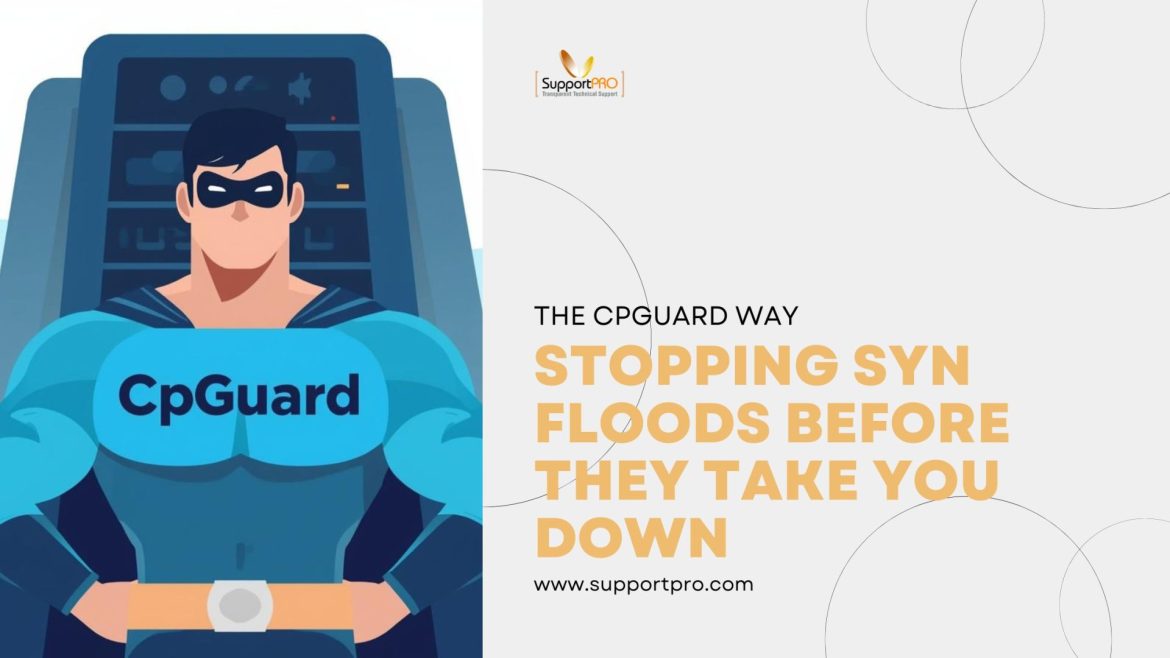SYN floods have been around forever, and they’re still a major threat in Linux server security, especially for hosting providers and cPanel users. The trick is simple: attackers blast your server with a ton of TCP SYN packets, but never finish the TCP handshake. Your server ends up stuck, waiting on connections that never really start, eating up memory and connection slots until everything slows to a crawl—or just crashes.
For web hosts, server administrators, and anyone running cPanel or other control panels, this means slow sites, broken services, and, yeah, unhappy customers. This is exactly where cPGuard security suite and its SYN flood protection steps in. Here’s a straightforward look at how cPGuard fights off SYN flood attacks and keeps your servers up and running.
What does a SYN flood actually look like?
Quick refresher: when a client wants to talk to your server, it sends a SYN request. The server answers with a SYN-ACK, then waits for the last ACK to finish the TCP handshake. In a SYN flood attack — a type of TCP handshake attack — the attacker just keeps sending SYNs and ignores the SYN-ACKs. Your server gets left with a pile of half-open TCP connections, wasting resources. The whole point of SYN flood protection here is to block those junk SYNs before they drain your server, but without messing with real users.
1. SYN rate limiting and connection throttling
When cPGuard spots a sudden spike in SYN packets bombarding your server, it jumps in right away and slows things down so your system doesn’t get slammed by a potential SYN flood attack. Your connection queue stays healthy—no overload. You call the shots, too. Slow down traffic everywhere, or just from certain IP addresses or networks if you want. Bots, malicious traffic, or rogue devices trying to flood you? cPGuard’s SYN flood protection boots them out fast, and your regular users cruise along without a hitch.
2. SYN proxy and TCP handshake validation
Picture cPGuard as a tough bouncer at the door. It only lets traffic through that finishes the TCP handshake. If a connection doesn’t check out, it never reaches your server. All that junk traffic from a potential SYN flood attack? Stuck outside.
3. SYN cookie support and kernel tuning
cPGuard isn’t just surface-level; it strengthens kernel-level SYN flood protection using SYN cookies and optimized kernel-level server hardening techniques.
4. Adaptive thresholds and behavior-based detection
Attackers keep switching tactics, so cPGuard keeps learning what normal traffic looks like. It watches out for weird stuff—big SYN floods, a bunch of half-open TCP connections from random places, or strange packet flags. It focuses on the real threats and ignores the usual noise.
5. Rate limiting by source and destination
You get to set the rules. Limit traffic based on where it’s coming from or which ports and services it’s hitting. So, you stay in control. Lock down sensitive ports like SSH, cPanel server security ports, or your control panel, but keep your public site open. One attacker doesn’t take everyone down thanks to source- and destination-based rate limiting.
6. Real-time monitoring, alerts, and logs
Thanks to real-time security monitoring, you always know what’s happening. cPGuard gives you live dashboards, logs on SYN rates, blocked IP addresses, and connection stats. Set up alerts for suspicious activity and jump in if you want—or just let cPGuard’s automated security monitoring handle things.
7. Geo and ASN-based restrictions
If attacks keep coming from certain countries or networks, cPGuard can block those geo-locations or ASNs. Do it just during an attack or leave the block in place for high-risk sources to improve DDoS mitigation.
8. Failover and graceful degradation
It puts critical traffic first, slows down or drops less important stuff, and helps your key apps stay up and running during server overload or a high-volume SYN attack.
So—why does this matter? Because SYN flood attacks can take down your server fast, and cPGuard gives you tools to spot, block, and survive these DDoS-style SYN floods without constant babysitting.
SYN floods are loud and often short-lived—attackers are usually just looking for easy targets. With cPGuard security suite, you get a mix of kernel-level hardening, TCP handshake validation, smart rate limiting, and automatic SYN flood blocking. The result? Attacks get stopped fast, real users aren’t locked out, and you spend less time fighting fires. Hosting providers, server admins, and cPanel/WHM users get steadier services and a lot less stress during those ugly moments.
Some quick tips for admins
Fine-tune your thresholds to match your usual traffic. cPGuard learns as it goes, but getting the initial setup right helps a ton. Set tougher rules for sensitive ports and services—don’t treat everything the same. Keep an eye on your security dashboards, real-time alerts, and SYN flood activity logs. Automation does the heavy lifting, but a quick response from you can make all the difference when something really odd shows up.
Don’t wait for an attack to expose vulnerabilities. SupportPRO’s security experts can fine-tune cPGuard , strengthen server hardening, improve cPanel server security, and optimize your defenses in minutes.
Partner with SupportPRO for 24/7 proactive cloud support that keeps your business secure, scalable, and ahead of the curve.




